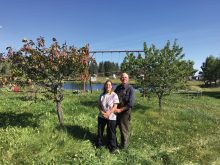“They trust us. That’s a lot more than a piece of paper.”
– CINDY MURRAY, ORGANIC FARMER
Incoming rules that make using the word “organic” to describe how she farms off limits unless she is certified won’t change how Minnedosa-area farmer Cindy Murray operates.
She and husband Doug Proven plan to go right on farming the way they have for 20 years – selling their organically raised beef and pork direct to customers. If they have to refer to the way they raise their meat, they’ll just call it “natural,” says Murray.
Read Also

Mazergroup’s Bob Mazer dies
Mazergroup’s Bob Mazer, who helped grow his family’s company into a string of farm equipment dealerships and the main dealer for New Holland machinery in Saskatchewan and Manitoba, died July 6 from cancer.
Murray and Proven quit certifying their farm a couple of years ago. The cost and paperwork involved was too high – plus they realized it didn’t matter to customers, who know them personally and have seen how they farm and raise their animals.
“They trust us,” says Murray. “That’s a lot more than a piece of paper. In all the years we were certified, we used that certificate once, and that was when an individual bought (one side of) beef to sell into a restaurant in Winnipeg. The rest? No one has ever asked and doesn’t seem to care.”
NEW RULES
However, Murray and Proven will be watching with interest to see how new rules governing production and marketing of organic, including the certification requirement for organic claims, shakes out.
Manitoba’s own legislation, Bill 13: The Organic Agricultural Products Act (OAP) is due to take effect June 30, the same day as the new federal Organic Products Regulations (ORP) become mandatory.
The new regulations will be enforceable by the Canadian Food Inspection Agency (CFIA) through an inspection-by-complaint basis. In other words, if someone claims you’re calling uncertified product organic, expect a visit from CFIA.
The move has led to many questions about what this means for many of Manitoba’s smaller producers, who’ve dropped out of certification circles over the years, or never pursued certification in the first place.
Census of Agriculture (2006) statistics showed a major gap in between those said to be organic and those certified.
TOO COSTLY
Of 800 self-identified organic farmers that year, just 200 were actually certified by an organic-certifying agency. That finding prompted Organic Food Council of Manitoba (OFCM) last year to start asking some questions of its own. In a quick survey, it called growers and asked why. That produced a litany of the kinds of complaints like Doug’s and Cindy’s.
Certification had become too costly and time consuming a procedure. Moreover, it had become geared to farmers growing for export.
That’s why Manitoba’s organic sector is now eyeing the potential to create an alternative certification process more appropriate to smaller growers. An alternative would not compromise or “water down” the expectations of the standard, proponents stress.
“We’re starting with the assumption that the standard is a good thing,” David Neufeld, a member of OFCM said last summer, after meeting with Organic Producers Association of Manitoba (OPAM) to discuss options. “It’s the process we want to look at.”
NEW OPTIONS NEEDED
OPAM and OFCM agreed some options were needed. An alternative certification process customized for smaller growers is also supported by a new umbrella group organizing in Manitoba. “We have talked about it at length,” said Manitoba Organic Alliance’s interim chair Paul Gregory. MOA supported the OFCM in its bid to the Organic Federation of Canada this past year to pursue an alternative, Gregory said.
OFC, which sees a similar problem developing across Canada, has given Manitoba the nod to look into this, said Janine Gibson, chair of OFCM and that group’s representative on MOA. Gibson, who is also an organic farm inspector, will now do a quick review of all other certification processes geared to smaller growers elsewhere in Canada and the U. S. She hopes to have options with a cost-benefit analysis of each available by March’s end. “It’s been determined that it’s needed, but what form should it take?” she said. “I want to look at what’s working in other places.”
The OFC agreed to fund this small study and see what Manitoba proposes “because this is an issue all across the country and because there are local farmers who are being left out,” she added. “Often they’re the pioneers of organic in their regions.”
NATIONAL PROBLEM
OPAM initially agreed to take a look into some alternatives itself but turned the job over to MOA because the issue affects more than only Manitoba, said Trevor Tuttosi, OPAM general manager.
“It’s a national and industry-wide problem,” he said. “That’s how it ended up out of our court.”
OPAM had hoped an alternative might have been in place in time for this year’s growing season, he added. That’s not looking realistic now, Tuttosi said. “It’s a work in progress,” he said. “The important thing is we’re working on it.”
Murray said even if this matter of how to get certified doesn’t really affect them, she thinks an alternative is needed for new entrants.
“We have that relationship (with customers) and it will carry on,” she said. “But for young people just coming in…. that’ll be a different story.”



















